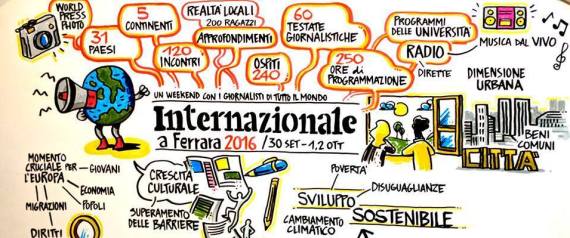Steamgreen has gone far this week for its readers: it has flown to China, stopping in Spain before landing in Brasil and then popping up in US.
And all of this while remaining in Ferrara.

In fact Ferrara, the town whose historical centre was claimed to be UNESCO heritage site, hosted during the weekend the annual 3-days-long festival about international journalism.
“Internazionale” is the Italian weekly magazine which organises this event; its name is due to the fact that it focuses on international perspectives and news, and its wit lays in the fact that a large number of the pieces are translated into the Italian language from international newspapers.
Therefore, this yearly happening is really not to miss because very special guests coming from all over the world gather in this medium sized town in Emilia.
This year the event featured famous journalists such as Oliver Burkeman (the Guardian), Dan Savage, David Randall (the Independent) but also economists and experts on various disciplines, such as Paul Mason, Julia Cagé and Olivier Roy (expert on IS).
Among the interesting activities to which Steamgreen assisted, one was definitely worth to be signalled.
The Italian journalist and writer Stefano Liberti presented on the last day his latest book called “ I Signori del Cibo. Viaggio nell’industria alimentare che sta distruggendo il pianeta” (In English: “The Lords of food. A journey into the planet- consuming food industry”), published by mimimum fax (pp. 328, Eur 19).

The investigative report is divided into 4 chapters, which symbolize the major criticalities defining the grocery world: soy, pork, tuna and tomato paste.
During the public speech the author told to the audience some worth knowing meetings he had during his various trips.
For example. in the US he visited North Carolina’s pig farms but from a very peculiar perspective: from a airplane. From up there he had the chance to see how the pigs are stuffed into barns, with no open air chance. Next to those warehouses he noticed this, so called, lakes. Those are far from being crystal blue, natural places: they are en-plein-air piggy toilets, since the animals have no possibility of moving and of depositing their own scraps in some defined area.
But there is another horrifying detail: those lakes are pink. Why pink? Because the animals, actually literally living side by side 24/7, and sharing everything, need to be filled up with massive quantities of antibiotics, which serve as a means of prevention towards possible infections that could threat the financial rent of their meat.
The issue is, except for the indiscernible cruelty, that we, pig-eating humans, will absorb those antibiotics, without actually be warned or being aware of it.
Related to the pig-story, he also investigated the Chinese market, which is enormous in quantity as Chinese are more than 1.3 billion. He found out that the market share is concentrated in very few (in the order of 3-4mega companies), which are state-driven and manipulate “pig-reserves” in order to be able control the price of such meat.
This book, however seems to indicate a possible happy ending.
Mr. Liberti, while telling his adventures in discovering the characteristics of tuna market, said that inspiration for our daily actions could be taken from the American experience in this sense: when the consumers found out about the scandal about how tuna fishes were caught, and what possibly was included in a tuna can (aka dolphins, turtles), the consumers became sensitive towards the matter and modified their behaviour consistently, forcing the market to change practices.
The moral is: there is always a way, let’s be informed and lets Steamgreen!



